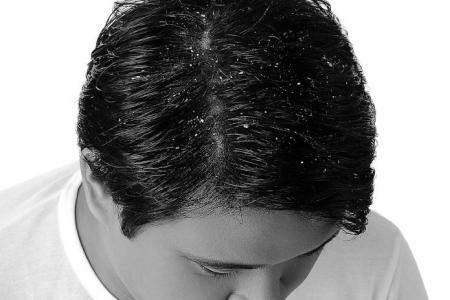When dandruff means more than an itchy scalp
In the second of a two-part special on hair health, CATHERINE ROBERT (crobert@sph.com.sg) explores the issue of dandruff
It is a common problem that most people go through at least once in their lifetime.
The good thing is, you can work on the condition as soon as you see white flakes appearing on your scalp. The scalp condition usually comes with itchiness.
Last year, consumer research company Nathan Rich Research polled 200 men and women here, and it found that one of the top hair problems faced by men in Singapore is dandruff.
Trichologist Jane Ang explained to tabla!: "Dandruff is more common in men due to the influence of androgens (male hormones) and larger sebaceous glands (a gland in the skin that secretes oily or waxy matter)."
Dandruff, which can be most obvious on someone's hair or shirt, comes from the scalp. (See report at right.)
EXTREME
Another study released late last year, which focused on Singapore and South-east Asia, showed that more extreme cases can even lead to terminal illnesses.
An international team of scientists from A*Star's Genome Institute of Singapore, Institute of Medical Biology and Bioinformatics Institute, and Procter and Gamble revealed that Malassezia - the cause of hair issues such as seborrheic dermatitis, eczema and dandruff - is also linked to skin cancer, the "sixth most common cancer in males and the seventh in females in Singapore".
The scientists completed their first comprehensive genomic and biologic study of all known species of Malassezia, a type of fungi that grows on the sebaceous areas of human skin like face and scalp.
The research said that our "hot and humid climate provides a perfect environment for fungi to thrive" and concluded that "Singapore has the highest reported incidence of fungal-mediated skin disease in the world".
But most people suffer from a mild case of dandruff. In such instances, using the correct anti-dandruff shampoo suitable for one's individual hair types can get rid of the problem easily.
Dr Derrick Aw, a senior consultant at the University Dermatology Clinic at National University Hospital, suggests using "shampoos containing tar derivatives, salicylic acid or an anti-fungal agent" as those agents help to "treat and control dandruff and scalp oiliness".
A hair care expert from Beijing 101, a centre that prides itself on solving hair issues through the use of traditional Chinese medicine, says dandruff - whether mild or severe - is a problem that needs to be dealt with as soon as possible.
"If it is not related to health issues, it can lead to other embarrassing outcomes," says the expert.
"If dandruff isn't dealt with promptly, the possibility of it leading to hair loss is quite high."
I became a teenage hermit over 'snowflakes'
"Girl, for goodness' sake, stop scratching your head."
That was a line my mother used repeatedly through my teenage years, right up to my early adulthood.
I was 15 when I started seeing "snowflakes". Not from the sky but in my hair. I used to joke my head is experiencing winter.
But the humour waned as boys started pointing the dandruff out to me. At 15, that was beyond embarrassing and probably my worst nightmare.
It was then that dandruff affected my self-confidence.
Black tops were my favourite, but it was also the biggest snitch.
Those pesky flakes would decorate my back like a confetti shower.
It was horrible. I became a recluse for three months.
My mum took me to different beauty salons, where hair experts said the same thing: My dandruff stemmed from an extremely dry scalp.
It didn't help that I was at an age where I wanted to keep up with the latest trends. I used to sit in front of the mirror and try out the most fashionable hairstyles that appeared in magazines or on the runway.
PRODUCTS
That meant I used hair sprays and other types of hair products. It was one of the main reasons my dandruff problem spiralled out of control. The products I used aggravated my skin.
I still remember one hair stylist telling us: "You already have dandruff but your itchy fingers are making it worse."
He later explained that giving in to the itch inflamed my scalp even more and caused further damage to my skin.
One other wrong step: Leaving my hair to dry on its own after a shampoo.
Wet hair is more susceptible to damage and breakage. The sweat and damp that accumulate on the scalp when the hair is drying can encourage itchiness and flaking.
I learnt a lot from my stint dealing with dandruff and it wasn't pretty.
My advice: Fix it as soon as possible.
"I still remember one hair stylist telling us: "You already have dandruff but your itchy fingers are making it worse."
Ask the expert

We get an expert from Beijing 101, a hair care centre, to answer some common questions on dandruff
WHAT IS DANDRUFF?
White flakes that come from your scalp. The flakes can also be light yellow or grey.
HOW DOES IT COME ABOUT?
Dandruff is usually caused by an itchy scalp, which can be attributed to several conditions including an increase in oil production, hormonal fluctuations, stress, illnesses or suppressed immune system and infrequent shampooing.
DOES DANDRUFF LEAD TO HAIR FALL?
Yes. It will eventually lead to hair fall if it is not taken care of.
WHAT IS THE BEST AND FASTEST WAY TO GET RID OF DANDRUFF?
Undergoing a hair and scalp treatment regularly is important. Try going for treatment twice a week.
At Beijing 101, our consultants are able to give customers a detailed hair and scalp analysis in order to customise treatment for each person.
DOES MY DANDRUFF HAVE ANYTHING TO DO WITH MY DIET? DO I NEED TO IMPROVE MY FOOD INTAKE TO HELP WITH THE PROBLEM?
Yes, dandruff is related to diet, and you need to have a well-balanced diet to improve the problem.
Our consultants are certified in traditional Chinese medicine and can help you maintain a healthy and balanced nutrient intake to improve hair and scalp issues.
For starters, take less salty and spicy food. For itchy scalp, reduce the intake of seafood and peanuts.
Chinese herbs including ginseng, dang gui (Chinese angelica) and he shou wu (Chinese fo-ti) help with different hair issues, like preventing hair loss - which is the eventual outcome of prolonged dandruff. Ginseng, in particular, helps with an oily scalp.
Get The New Paper on your phone with the free TNP app. Download from the Apple App Store or Google Play Store now


